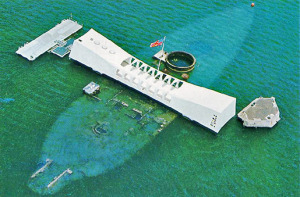By: Chris Warren.
In college I had an English professor who once declared, “every present has a different past.” He was speaking in terms of history and what he meant was that events do not have a static meaning. How a past event is viewed now is not the same as what it meant at the time it happened, nor at any point since then. This is why history is more than just a factual list of dates and events. To understand history is to enrich oneself not only by making a connection between then and now, but also maintaining that connection for the future.
On December 7, 1941 the Japanese bombed the American Navy at Peal Harbor, Hawaii and and pushed the United States into World War II. That is the “factual list” version. To find the “enrich oneself” version, we must look into the personal accounts of the soldiers & sailors who were there when it happened, keeping in mind that they were not merely eyewitnesses to history. They actually created it.

It is becoming more and more difficult to investigate the experiences of those who made history that day because as years click by there are fewer and fewer Pearl Harbor veterans remaining. Of the approximately 60,000 service members who survived the bombing, less than 2500 are believed to be still alive. The youngest are now in their 90s, so the harsh actuarial math for an event seventy three years behind us is not hard to figure out: Within a decade, maybe a little longer, there will be no one left to talk about it.
That Pearl Harbor is on the cusp of a transformation from living to recorded history is not lost on the few remaining survivors. Retired naval officer and Pearl Harbor veteran Jackson Davis of Shreveport, Louisiana references this by tapping into wisdom collected over his 95 years of living: “We don’t hear much about Gettysburg anymore, or Bunker Hill. Or when the Normans took over England — we don’t hear much about that.” Mr. Davis’ observation, while true, skims over a larger point: The value of history is not measured by how popular a topic of conversation an event may be. He is correct that hardly anyone talks about the Normans invading England (which, by the way, was in 1066) as if it were a recent event. Influences of the Norman conquest nearly 950 years ago can still be found embedded deep in the British psyche. Had the Norman invasion never happened, England would be a very, very different place today. That is why it matters. That is why it is worth talking about and remembering.
“We don’t hear much about Gettysburg anymore, or Bunker Hill. Or when the Normans took over England — we don’t hear much about that.” -Pearl Harbor veteran Jackson Davis
It’s unlikely that yet-unborn Americans will be fully cognizant of how Pearl Harbor effects their world any more than The Battle of Bunker Hill (fought in 1775) enters our thoughts now, and it’s an unstoppable reality that there isn’t much time left for soldiers & sailors who lived through that dark day to give their first person testimony. Mr. Davis and his peers can be assured that the story they have been telling for that last 73 years will have no end. The heroes who were at Pearl Harbor, Hawaii on December 7, 1941 and served with such amazing valor will always matter. Their spirit and selflessness is the connection to the present; it’s the very essence of why their place in the permanent record was so rightfully earned. We may not always talk about it, but we will always live it. When the last Pearl Harbor veteran is silenced by the inevitability of time, history will take over and be their voice through the generations.